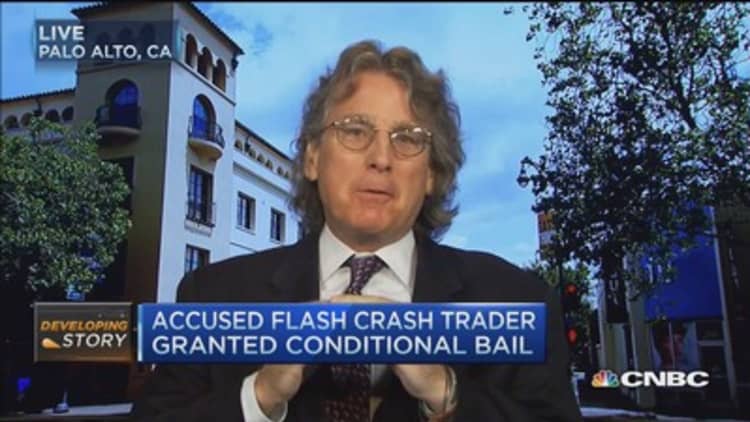
As more light is being shed into what led to the "flash crash" of 2010, the need for stronger market regulation becomes more apparent, Elevation Partners' co-founder Roger McNamee said Wednesday.
"The problem we're dealing with here is that, from a regulatory perspective, it feels like whack-a-mole. The flash crash was the result of trading practices that were really widespread in 2009 and 2010, and the fact that one guy may have, allegedly, triggered that whole thing … terrifies me, as an investor," McNamee told CNBC's "Squawk Alley."
McNamee made his remarks after Navinder Singh Sarao, the man charged with triggering a 1,000-point selloff of the Dow Jones industrial average in 2010, was granted bail by a U.K. court.
U.S. authorities have also asked the British government for Sarao's extradition, but he said he would be fighting it.
"What really bugs me is that they got this guy, but it doesn't matter. The people who are trading in these markets have moved on to other techniques," McNamee added.
Read More 'Flash crash' trader granted conditional bail by UK court
With regards to why it took so long for the authorities to bring forward legal action against Sarao, Timothy Massad, chairman of the U.S. Commodity Futures Trading Commission, said "sometimes it takes a long time to put cases together."
"These are huge markets, there's a lot going on," Massad added.
McNamee said he agreed with Massad's remark, but only to a point. "The problem is that this is a minute percent of the regulatory problem. The real problem is that the banks and large hedge funds are doing practices that are currently 'legal,' might not have legal before the deregulation of the 1980s and 1990s."
Apple Watch = big deal for Apple Pay
McNamee also addressed why he believes the Apple Watch will lead to more consumers using Apple Pay.
"Think about it for a moment. A watch is on your body. It is very secure. It is always there. If you're in a retail situation, the notion of putting your wrist up to the pay station is incredibly convenient," McNamee said. "When they [sold] a million units in the first day, I think you have to look at this as like the really pointy part of the spear driving apple pay into the marketplace."
Apple Pay launched in the U.S. last October, while preorders for the Apple Watch have been available since April 10.


